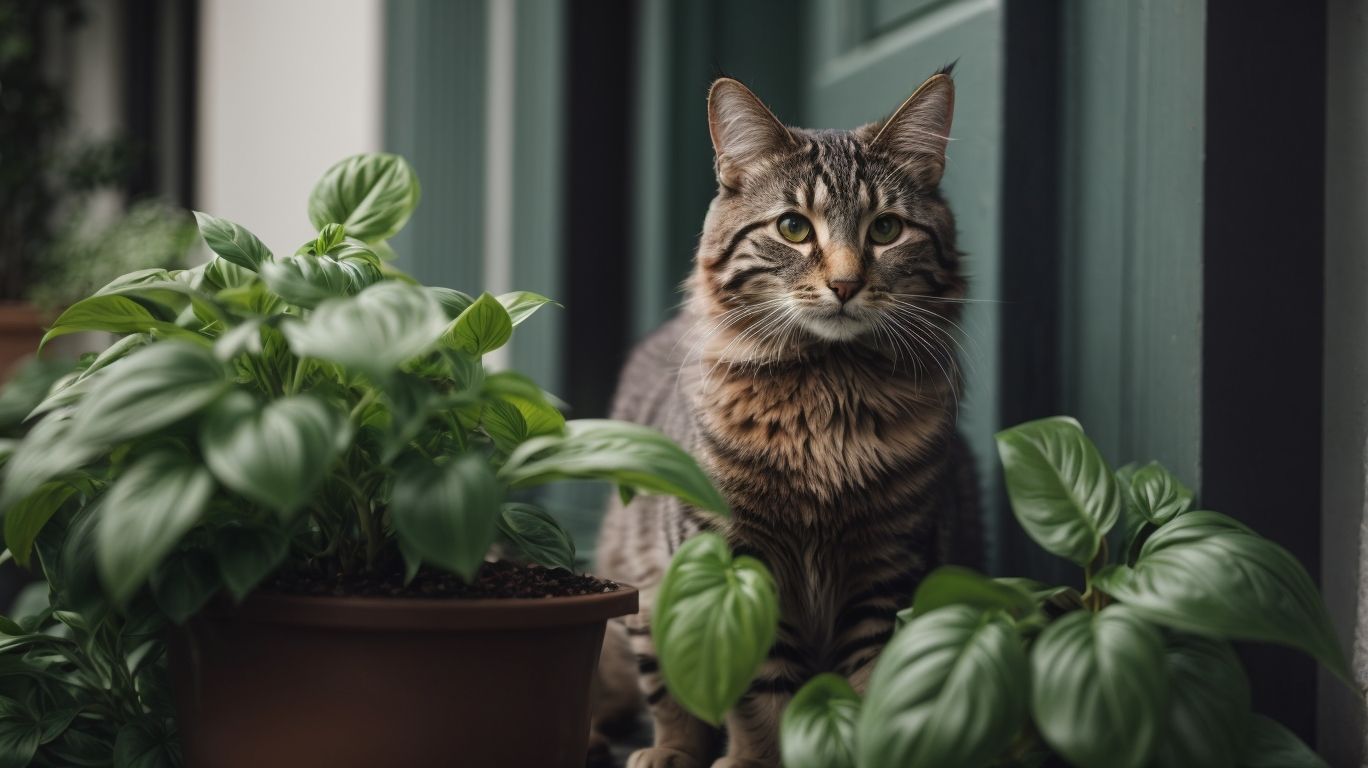Curious about whether it’s safe to share your favorite herb with your feline friend? In this article, we’ll explore the question, “Can cats eat basil?”
We’ll discuss the nutritional benefits of basil for cats, how much they can safely consume, and the potential risks of feeding them this aromatic herb. We’ll also cover alternatives, such as other cat-friendly herbs and fruits, and how to incorporate basil into your cat’s diet.
Stick around to find out if your kitty can enjoy basil pesto and dried basil!
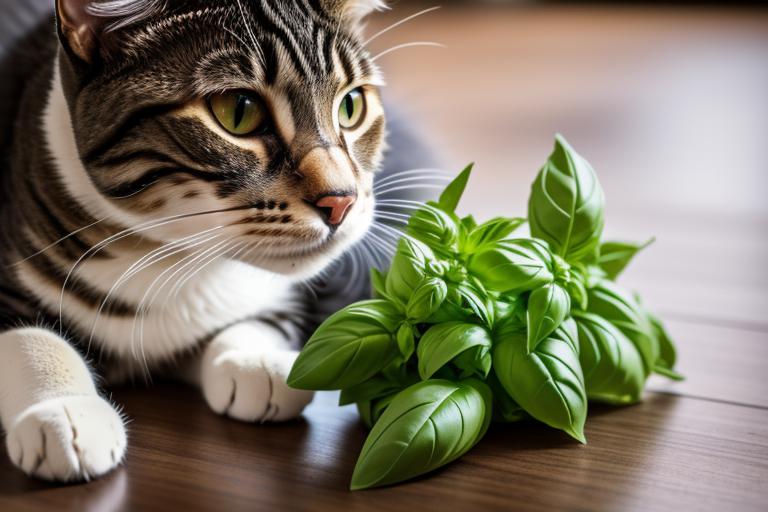
Many cat owners wonder, can cats eat basil? It’s important to understand the potential effects of basil consumption on feline health and safety.
While basil is generally considered safe for cats in small quantities, excessive consumption may lead to digestive issues such as vomiting or diarrhea. It’s essential to ensure that the basil is free from any pesticides or other harmful chemicals before feeding it to your feline friend.
When given in moderation, basil can offer some health benefits for cats. It contains antioxidants and nutrients that can support their immune system and overall well-being. As with any new food introduced to a cat’s diet, it’s crucial to monitor their reaction and consult with a veterinarian to ensure it aligns with their specific dietary needs.
You can incorporate basil into your cat’s diet by adding a small amount to their food or using it as a garnish. Always remember that moderation is key when it comes to including herbs like basil in a cat’s diet.
What Is Basil?
Basil, also known as Ocimum basilicum, is a popular culinary herb utilized in various cuisines for its distinct flavor and aromatic properties.
Basil belongs to the mint family and is known for its sweet, peppery taste with hints of anise or clove.
There are several types of basil, including Genovese, Thai, and Holy basil, each with its unique flavor profile. This versatile herb is used in a wide array of dishes, such as Italian pesto, Thai curries, and Mediterranean salads. It’s also a key ingredient in sauces, soups, and marinades, adding a delightful freshness to the culinary creations.
Is Basil Safe for Cats to Eat?
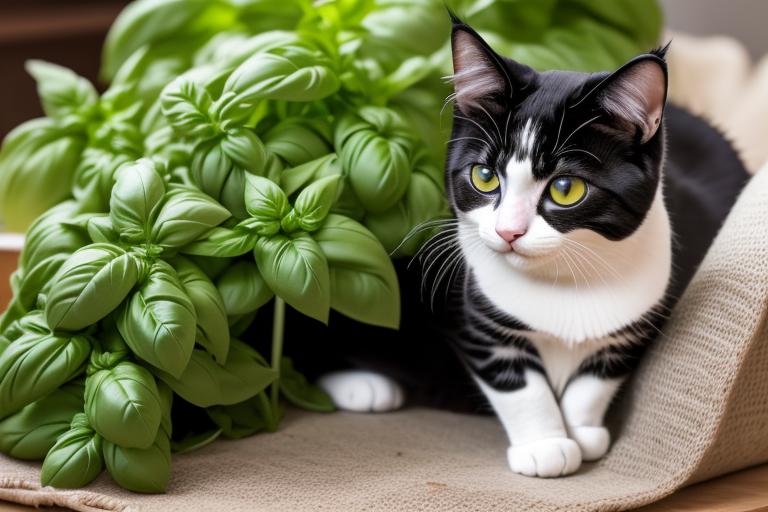
Understanding the safety of basil for cats is essential for responsible pet care, as certain herbs can have varying effects on feline health.
Before adding any new foods or herbs, like basil, to a cat’s diet, it’s crucial to consult with a veterinarian. This is especially important because some cats may have allergies or sensitivities to certain herbs. A veterinarian can provide personalized advice based on the cat’s health and dietary requirements.
When incorporating basil into a cat’s diet, it’s essential to do so in moderation. This helps to prevent any potential adverse reactions. It’s also recommended to use organic, pesticide-free basil to minimize any potential health risks for cats.
What Are the Nutritional Benefits of Basil for Cats?
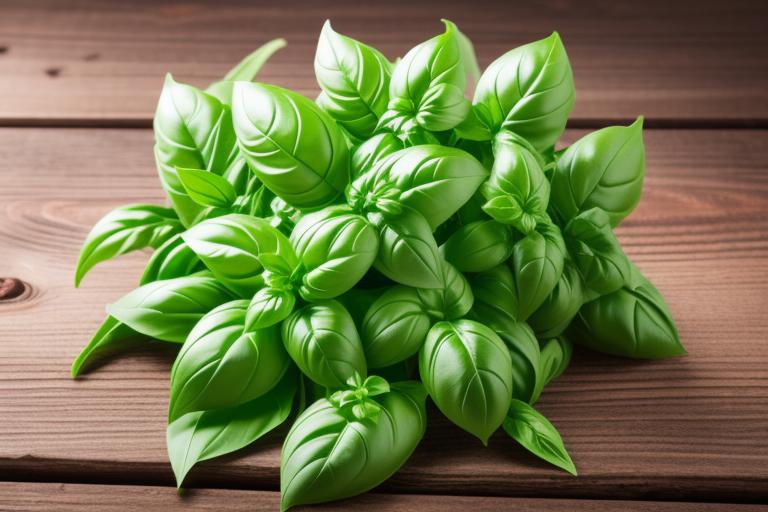
Basil offers potential nutritional benefits for cats, contributing to their overall feline health and well-being through its unique nutrient profile.
Basil is a nutrient-dense herb that contains vitamins A, K, and C, along with essential minerals like calcium, iron, and magnesium. These nutrients are crucial for maintaining strong bones, organs, and overall vitality in cats.
Additionally, basil has antioxidants and anti-inflammatory properties that can boost a cat’s immune system and alleviate digestive problems. When fed in moderation, basil can be a beneficial supplement to a cat’s diet, promoting their overall health and well-being.
How Much Basil Can Cats Eat?
Determining the appropriate quantity of basil for cats in their diet is crucial to ensure balanced pet nutrition and adherence to dietary restrictions.
Basil can be beneficial for cats in small amounts due to its antioxidant and anti-inflammatory properties.
It’s essential to carefully monitor the portions, as large quantities can lead to digestive issues.
A suggested approach is to sprinkle a small amount of finely chopped fresh basil over their food to introduce the herb gradually.
Always consult with a veterinarian before incorporating any new ingredients into a cat’s diet to ensure it aligns with their specific dietary needs and restrictions.
What Are the Potential Risks of Feeding Basil to Cats?
Feeding basil to cats carries potential risks related to its impact on feline digestive systems and overall health, necessitating careful consideration and awareness.
Basil is generally safe for human consumption, but its essential oils, such as phenols and polyphenols, can cause digestive upset and potential toxicity in cats.
If your cat ingests basil, they may experience symptoms such as vomiting, diarrhea, and lethargy.
In more severe cases, basil consumption can lead to liver damage and other serious health issues in felines.
It is always best to consult with a veterinarian before introducing basil or any other herbs into your cat’s diet to ensure their safety and well-being.
Can Cats Be Allergic to Basil?
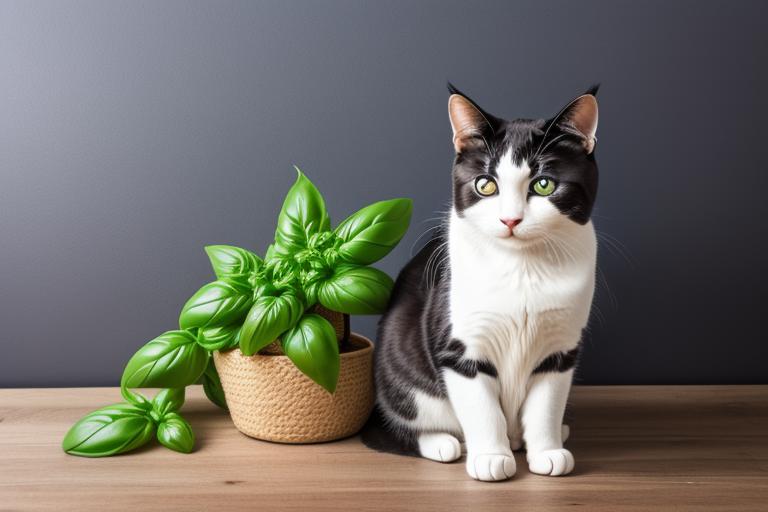
Allergic reactions in cats related to basil consumption raise concerns about feline safety and pet care, warranting attention to potential sensitivities.
Symptoms of a potential basil allergy in cats may include sneezing, itching, and skin rashes, which can be distressing for both the pet and the owner.
Accurate diagnosis is crucial, involving a visit to the veterinarian to rule out other potential health issues. If a cat indeed shows allergic reactions to basil, it is important to eliminate its exposure to the herb and seek guidance on alternative dietary options to ensure their well-being.
Can Basil Cause Digestive Issues in Cats?
Basil’s impact on feline digestive systems raises questions about potential digestive issues in cats, highlighting the need for careful observation and pet health management.
As cat owners, it’s important to be aware of how basil can affect our pets’ digestive health. Consuming large amounts of basil can cause discomfort, vomiting, or diarrhea in cats. To prevent this, it’s recommended to limit the amount of basil given to cats and make sure it’s properly washed to remove any harmful substances. A balanced diet consisting of appropriate cat food is crucial for supporting their digestive health and overall well-being.
Can Basil Be Toxic to Cats?
The potential toxicity of basil for cats underscores the importance of understanding its impact on feline health and overall safety within a pet environment.
Basil is a popular herb in human cooking and has numerous health benefits. However, cat owners should be mindful of the potential dangers if their pets consume this herb. Some compounds found in basil, like essential oils and soluble oxalates, can be harmful to cats in large amounts. This highlights the importance of being cautious and responsible when introducing basil or any other herb to a pet’s surroundings.
What Are Some Alternatives to Feeding Basil to Cats?
Exploring alternative herbs and plant consumption options offers diverse choices for incorporating nutritional elements into a cat’s diet, beyond the scope of basil.
These plant-based options can provide a range of health benefits for your feline companion. For instance, catnip, known for its enticing effects on cats, can also aid in digestion.
Parsley and mint, when offered in moderation, may contribute to fresher breath and better digestion. Cat-friendly herbs like thyme and dill not only add flavor to their meals but also offer potential medicinal properties. By considering these alternatives, you can ensure a varied and balanced diet for your pet.
What Other Herbs Are Safe for Cats to Eat?
Identifying safe herbs for cats to consume expands the range of culinary and nutritional choices available for pet diets, promoting feline health and wellness.
These herbs not only add flavor and variety to your cat’s meals but also serve as natural remedies for digestive issues and other common health concerns.
When considering herbal additions to your cat’s diet, it’s essential to prioritize pet-safe options such as catnip, parsley, and basil. Integrating these herbs can offer antioxidants, vitamins, and minerals that contribute to overall well-being, making them a valuable inclusion in your cat’s nutritional plan.
What Are Some Cat-Friendly Vegetables and Fruits?
Incorporating cat-friendly vegetables and fruits into a pet’s diet expands nutritional diversity and dietary options, contributing to overall feline health and balanced nutrition.
This approach also allows pet owners to offer a range of textures and flavors to their cats, making mealtime more exciting and enjoyable.
Some excellent vegetable options for cats include steamed carrots, cooked green beans, and mashed pumpkin, each providing essential vitamins and fiber. Similarly, cats can benefit from the occasional addition of fruits such as mashed berries or small pieces of apple, offering natural sweetness and beneficial nutrients.
It’s essential to monitor portion sizes and avoid offering large quantities of fruits that are high in sugar, as this can lead to digestive issues.
How Can You Incorporate Basil into Your Cat’s Diet?
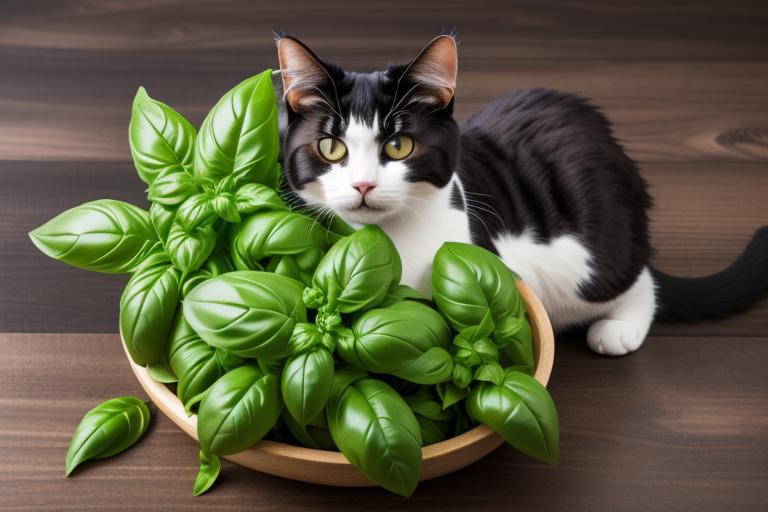
Incorporating basil into a cat’s diet requires careful consideration and methods to ensure balanced pet nutrition and the safe consumption of culinary herbs.
When introducing basil to a cat’s diet, it is essential to consult with a veterinarian to ensure it aligns with the cat’s individual health requirements.
Proper preparation of basil involves removing any stems and ensuring that the leaves are finely chopped or crushed to prevent choking hazards. As with any new food introduction, it’s crucial to start with small quantities, gradually increasing as the cat becomes accustomed.
Monitoring the cat for any adverse reactions or digestive issues is also important as some cats may have sensitivities to new foods.
Can Cats Eat Dried Basil?
The suitability of dried basil for cats’ consumption influences considerations for incorporating culinary herbs into a pet’s diet. This emphasizes the importance of safe feeding practices and balanced nutrition for our feline friends.
When introducing dried basil or other culinary herbs to a cat’s diet, it’s crucial to do so in moderation and consult with a veterinarian beforehand. While some herbs offer potential health benefits, excessive consumption may lead to adverse effects.
Cat owners should also ensure that the herbs are free from any additives, preservatives, or other potentially harmful ingredients. It’s essential to source high-quality, organic dried basil to minimize the risk of exposure to pesticides or other contaminants. With proper care, incorporating dried herbs can add variety and potential health perks to a feline’s diet.
Can Cats Eat Basil Plants?
The potential effects of cats consuming basil plants highlight considerations for pet safety and plant toxicity, necessitating awareness of feline interactions with herbaceous vegetation.
This is particularly important for pet owners who grow basil at home or have access to fresh herbs, as cats are naturally curious and may ingest plant material.
While basil is generally considered safe for cats in small amounts, it’s essential to monitor their consumption to avoid potential digestive issues. Some cats may also exhibit allergic reactions to basil, so it’s best to introduce new plants slowly and observe any adverse effects.
Implementing safe practices, such as providing alternative cat-friendly greens and keeping potentially harmful plants out of reach, can minimize the risks associated with feline interactions with basil and other herbs.
Can Cats Eat Basil Pesto?
The suitability of basil pesto in a cat’s diet raises questions about culinary herb consumption and pet feeding practices, emphasizing responsible approaches to incorporating herb-based condiments into feline nutrition.
Cats are known to be obligate carnivores, and their digestive systems are sensitive to certain foods, including herbs.
When considering incorporating basil pesto into a cat’s diet, it’s essential to be mindful of the ingredients, such as garlic and onions, which can be harmful to felines.
While basil itself is generally safe for cats in small amounts, it’s important to consider the overall balance of their diet, consulting with a veterinarian if you are unsure about any potential risks or benefits of introducing basil pesto or other culinary herbs into their meals.
Frequently Asked Questions
Yes, cats can eat basil in small amounts. It is safe for them to consume, but it should not make up a large portion of their diet.
No, basil is not toxic to cats. It is safe for them to consume, but in moderation.
Some cats may be attracted to the smell or taste of basil and may want to eat it. Basil also has some nutritional benefits for cats.
It is recommended to only give your cat a small amount of basil at a time, such as a few leaves. Too much basil can upset their stomach and cause digestive issues.
Basil contains antioxidants and vitamins that can benefit a cat’s overall health and immune system. It may also help freshen their breath.
Kittens should not be given basil until they are fully weaned and eating solid food. Even then, it should only be given in small amounts and monitored for any potential reactions. Consult with your veterinarian before giving any new foods to kittens.

